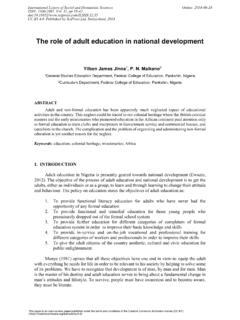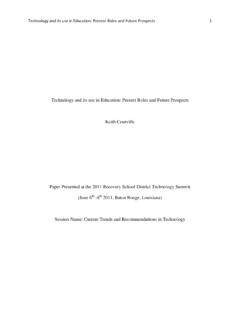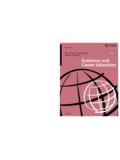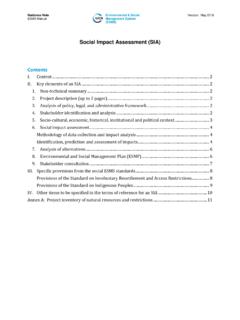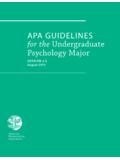Transcription of The Role of ICT in Teaching Science Education in Schools
1 International Letters of Social and Humanistic Sciences Online: 2013-12-22. ISSN: 2300-2697, Vol. 19, pp 217-223. CC BY Published by SciPress Ltd, Switzerland, 2014. The role of ICT in Teaching Science Education in Schools Hannatu Abdullahi Deparrtment of Educational Foundation, Shehu Shagari College of Education , Sokoto, Nigeria ABSTRACT. The place of ICT in Teaching Science Education in Schools cannot be over emphasized considering its promises in effective Teaching and learning. This paper examine the role of ICT in Teaching Science Education , its implication in both Teaching and learning process and an attempt have been made to discuss the use of ICT in Teaching and learning process. Keywords: ICT; Teaching Science Education ; school; Teaching and learning process 1.
2 INTRODUCTION. Information Communication Technology (ICT) are enabling technologies which include both hardware and software's necessary for delivering of voice, audio, data (high speed and ivv speed) videos tax and internet service from one point and associated equipment's that are connected via internet proto cold (IP) and non IP network (Aluko 2004) the world is text becoming a global village as a result of the development in information communication technology ICT (kolu and Ekwueme 2003). According to them the key instrument to this globalization is the computer. Computer mediate communication is increasingly becoming the fact of everyday life particularly in the developed and some developing countries. In these countries information and communication technologies have changed low people live work and play.
3 As it could be seen ICT is changing every aspect of human life trade, manufacturing communications service, culture, entertainment, Education , research, defence and global security (Akadolu 2002). In the submission of the World Bank (2001) ICT holds out the opportunity to revolutionaries pedagogical methods, expand access to quality Education and improve the management of Education . The present pedagogical pattern used in Nigerian classroom does not prepare students for the information, age and globalization, that is, it is not equipping students to live effectively in the modern age of Science and technology. It is quite over wheeling to stress that ICT gadgets simplify methods and strategies of acquisition of knowledge. 2. OVERVIEW OF ICT IN Education .
4 ICT, according to Ibe-Bassey (2011) is regarded as a critical tool for preparing and educating students with the required skills for the global work place. ICT is a diverse set of This paper is an open access paper published under the terms and conditions of the Creative Commons Attribution license (CC BY). ( ). 218 ILSHS Volume 19. technological tools and resources used to communicate, and manage information. (Tinio 2003, admin and Kpangban, 2010) in Amayuoyi (2012). According to Anthony (2012) the impact of ICT in Education cannot be overemphasized, it is interesting to note that 1. ICT removes problems concerning space and time - The students can communicate anywhere anytime. - The students can contact the teacher anywhere, anytime.
5 - The student can collect and exchange information anywhere, anytime. 2. ICT gives access to knowledge - In principles, the students can draw on a global pool of knowledge 3. ICT makes serving and sharing knowledge easier. - The students can individually and /or together create records notes and presentation and thus, register their progress and use it and examinations - This way they are also trained for future participation global research communication. According to bell and Margaret (2006), the following benefit emanate from the use of ICT Education . - Global access to knowledge - Instant sharing of experience and best practice - Self paced and self based learning - Learning become interactive and joyful through multimedia tools.
6 - Stimulations of experiential learning. - Opening windows for new thinking, an atmosphere of innovation - Bringing excitement and motivation, prove and owing technology, feeling of in a . way being ahead of time. 3. THE ROLE OF ICT IN Science Education . Science Education has it roots in the recognition by Victorian society that it had changed changed form an agrarian society to one dominated by and reliant on scientific and technological expertise. In 1851, the great exhibition brought the realization that this new society could only be sustained by ensuring that a body of people were educated in Science and technology. However, whilst there was little disagreement about the necessity for incorporating Science into curriculum, the form and content of that Science Education has since that time been a matter of considerable debate Osborne et al (2003).
7 They went further to say that opposing camps have laid between, on the one hand, those who would emphasize the need for Science Education to develop a knowledge and understanding of the basic scientific principles the foundation on which the edifice rests and, on the other, those who would argue for an emphasis on the processes of Science thinking. Osborne et al (2003) said, the dominant model of curriculum has been on which has seen Science Education as a pre-professional form of training for the ministry of today's youth who will become the scientist of tomorrow. This characteristics has arguably been responsible for the under valving of Science within the British establishment who have historically regarded it as a lesser form in contrast, were often seen as offering an Education of the complete individual.
8 There are four common rationals for Science Education . - The Utilitarian: the view that knowledge of Science is practically useful to everyone International Letters of Social and Humanistic Sciences Vol. 19 219. - The Economic: the view that we must ensure an adequate supply of scientifically trained individual to sustain and develop on advance industrial society. - The Cultural Argument: the view that Science and technology are one, if not the greatest, achievement of contemporary society and that a knowledge thereof is an essential prerequisites for the educated individual. - The Democratic: the argument that many of the political and dilemmas posed by contemporary society are of scientific nature. Participating in the debate surrounding there resolution requires knowledge of some aspects of Science and technology.
9 Hence, educating the populace in Science and technology is an essential requirement to sustain a healthy democratic society. (Osborne et'al 2003). 4. THE REALITY OF ICT USE IN THE SCHOOL Science LAB. Teacher's motivation to use ICT in the classroom is at present , adversely influenced by a number of constraints including; lack of time to gain confidence and experience with technology: limited access to reliable resources: a Science curriculum overloaded with content assessment that requires no use of the technology and a lack of subject specific guidance for using ICT to support learning. While this technology can in principle, be employed in diverse ways to support different curriculum goals and forms pedagogy. Such constraints have often stifled teachers use of ICT in ways which effectively exploit its interactivity.
10 Consequently well integrated and effective classroom use of ICT is currently rare. On the whole, use of ICT in school Science lab is driven by rather than transformative of the prescribed curriculum and established pedagogy. In sum, a teacher tends to use ICT. largely to support, enhances and complement existing classroom practice rather than re-shaping subject contents, goals and pedagogy. However, teacher's motivation and commitment are high and practice is gradually changing. Training teachers in using ICT in the classroom appears to have had more success in Science than in other subjects. Teachers are now beginning to develop and trial new strategies which successfully overcomes the distractions of the technology and focus attention instead on their intended learning objectives.

